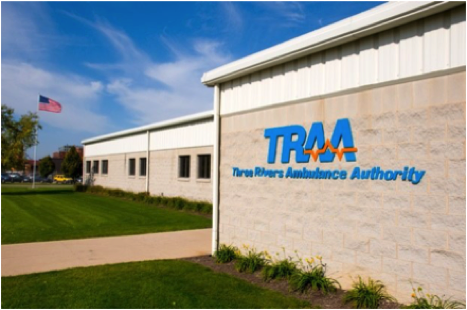
Name: Three Rivers Ambulance Authority (“TRAA”)
Founded: 1983
System Type: Governmental – Public Utility Model (PUM)
Primary Response Area: City of Fort Wayne, Indiana
Primary Response Area Size: 110 square miles
Primary Response Area Population: approx. 251,000
Secondary Response Area: Allen County, Indiana
Local Tax Subsidy: $0.00
TRAA is the City of Fort Wayne’s ambulance service. We provide all 911 emergency services and all non-emergency ambulance service to the citizens of Fort Wayne. We are not a private for-profit company, but are a not-for-profit unit of local government.
TRAA was created in 1983 by local ordinance adopted by the Fort Wayne City Council as a not-for-profit, governmental “authority” under Indiana law, to oversee and provide advanced life support (ALS) ambulance service to our community’s residents and visitors. The Commissioners of Allen County adopted TRAA as the county’s ALS service through adoption of an interlocal cooperative agreement until their withdrawal from the agreement in 2025.
TRAA receives no tax subsidy. We are required by ordinance to operate from fees charged for services provided. While there was an initial subsidy when the system was first started in 1983, and approximately a million-dollar infusion to stabilize services post covid pandemic, we have primarily remained tax subsidy free since 1986.
Formerly operating as a Public Utility Model, TRAA provided service through the use of a contractor for equipment and personnel to staff ambulances and our dispatch center until 2022. During the contract period, TRAA was the direct oversight agency of the contractor, assuring the contractor was compliant with items such as response time requirements, and other contractual obligations.
During 2022, TRAA assumed full Emergency Medical Service operations. This means that from processing 911 calls, to daily operation of ambulances, to billing, TRAA handles all components of care for the city of Fort Wayne.
TRAA’s rates are determined by TRAA’s Board of Directors They are set in accordance to state law HB 1385 passed in 2024.